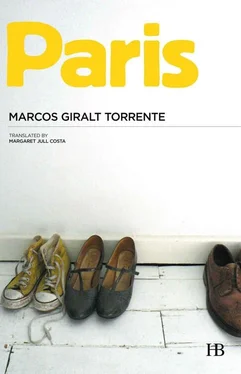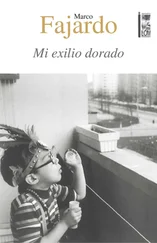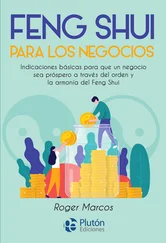Marcos Giralt Torrente - Paris
Здесь есть возможность читать онлайн «Marcos Giralt Torrente - Paris» весь текст электронной книги совершенно бесплатно (целиком полную версию без сокращений). В некоторых случаях можно слушать аудио, скачать через торрент в формате fb2 и присутствует краткое содержание. Год выпуска: 2014, ISBN: 2014, Издательство: Hispabooks, Жанр: Современная проза, на английском языке. Описание произведения, (предисловие) а так же отзывы посетителей доступны на портале библиотеки ЛибКат.
- Название:Paris
- Автор:
- Издательство:Hispabooks
- Жанр:
- Год:2014
- ISBN:9788494228452
- Рейтинг книги:5 / 5. Голосов: 1
-
Избранное:Добавить в избранное
- Отзывы:
-
Ваша оценка:
- 100
- 1
- 2
- 3
- 4
- 5
Paris: краткое содержание, описание и аннотация
Предлагаем к чтению аннотацию, описание, краткое содержание или предисловие (зависит от того, что написал сам автор книги «Paris»). Если вы не нашли необходимую информацию о книге — напишите в комментариях, мы постараемся отыскать её.
Paris — читать онлайн бесплатно полную книгу (весь текст) целиком
Ниже представлен текст книги, разбитый по страницам. Система сохранения места последней прочитанной страницы, позволяет с удобством читать онлайн бесплатно книгу «Paris», без необходимости каждый раз заново искать на чём Вы остановились. Поставьте закладку, и сможете в любой момент перейти на страницу, на которой закончили чтение.
Интервал:
Закладка:
V
Just how bitter those two years were for my mother, I have no idea.
Things happen, and later on you might recount them to someone else with more or less exactitude, and the image you convey will not be so very different from the original events. What you were feeling, though, what was going on inside you while those things were happening, is more a matter of silences. We can get quite close in our description of events, but we will never be able to describe their very essence, an essence tinged with despair, or joy, or with both at once. You might be able to give some sense of the intensity of those feelings, but not the whole diverse chain of connections of which they were composed. With the passing of time, feelings grow more impersonal, and their very impersonality renders them impenetrable.
That’s why it’s impossible for me to know what went on inside her during those two years, what waves of indifference broke over her spirit or where she found the necessary consolation, what she did or didn’t do, what she thought, what she regretted, what she missed — if, that is, she missed anything at all — and what depths of despondency she plumbed. When all of this was going on, she told me nothing, her life was a pretense, a permanent charade intended to allow me to carry on as normal, to sleep, eat, laugh, wake up, go to school, and even cry, without worrying about things I had no reason to worry about or that she didn’t want me to worry about. My mother was a rock, and if there was a chisel chipping away at her, if it caused dust or flakes of stone to fall onto the floor of her spirit or allowed time to erode her, revealing gaps and flaws and fractured veins, all of that happened while she was alone, without me as a witness, or, of course, as a confidant. After those two years, and with the return home of my father, things changed superficially but not fundamentally. I came to know about certain events that had affected me; she confided a truth that had previously been kept from me; I would talk to her and she would explain that something had happened this way or that, but we never touched on feelings, she never told me what went on inside her or what pain she felt, if indeed she felt any pain.
Leaving aside my age and the likelihood that any mother would have behaved the same, I cannot help but think that her personality played a large part in her behavior — her fear and her stoicism, her distance and aloofness from everything, the mixture of confidence and helplessness that made her such a complex person, simultaneously whole and divided, part fearless and unshakeable, part defenseless and vulnerable. My mother was a strong woman and had a capacity for resistance I’ve never encountered in anyone else, but, in a way, it was as if that strength existed outside her, like an ornament or an autonomous organism, a parasite, like those that coexist with certain mammals, and which she used in order to do things she would have been incapable of doing on her own. She could spend hours with other people, listening to their complicated unburdenings, advising them or consoling them if necessary, but never, ever putting herself in a similar situation. She inspired trust, and I doubt you could have found a better listener to whom to reveal your innermost thoughts, your most profound or superficial of anxieties, but I never heard her talking about herself or demanding attention. On the contrary, she always did everything she could to avoid the personal and, instead, would make someone else the center of attention, thus ensuring that no conversation would take her as its focal point or put her in the position of having to talk about things she didn’t want to talk about. I had more than once seen her crying, but I almost had to force out of her anything remotely resembling a confession or a confidence. There was no point in my alluding directly to what I knew to be the cause of her pain — the death of her mother and her subsequent life with her father, for example. Whenever I asked a question, she always replied in the same way: What do you want to know ? And I would ask her to tell me about this or that, and she would begin a gentle, melodious story going nowhere, full of insignificant details that in no way added to my knowledge, just a collection of anecdotes that showed her in everyday situations, which were utterly neutral and interchangeable with those experienced by anyone else: the day she spilled some soup on the tablecloth, the day she discovered her father’s gun, the day her sister left home. . I even questioned her about events I myself could remember, like the death of my grandfather, which, although it happened when I was only four, I can remember vividly, because that was the first time I saw her cry, and there was a clear contrast between her evocation of that incident and the substance of my memory, almost as if she were two different people, the one who was there at the time and whom I’d seen crying, and the one who was coolly answering my questions years later. To listen to my mother, you would think she’d never had any problems at all, that no one had ever raised their voice to her or treated her unkindly. Then, of course, I realized that this wasn’t true and that the very doggedness with which she avoided talking about the subject concealed more repressed pain, more signs in need of interpretation, than all the words she spoke. If I cornered her and she was unable to avoid answering my questions any longer, she would cast her eyes heavenward as if to keep them from filling with tears and remain silent for a moment, just long enough to ward off temptation, then she would take my hand and squeeze it briefly, timidly, drumming on it with her fingers rather than remaining in prolonged contact, then deftly change the subject. That was with me, of course; with strangers this was not even a possibility. Talking about herself would have meant allowing her “self” to surface, and that was something she simply could not allow. What she felt and how she really was had to be covered up, concealed beneath hundreds of protective veils — either learned or innate — beneath hundreds of habits — either learned or innate — that established a distance between her and the suffering or hopes that were watching and waiting inside her. I suppose what this revealed, deep down, was an intense shyness, an exaggerated rejection of any kind of exhibitionism or attention-seeking, of surrendering to other people’s pity. She would have found it demeaning to talk to someone about what she missed or what was hurting her, and she could never allow that. My mother was very proud and kept her head held high at all times. Family was one thing, and that, of course, included my father as well as her sister and myself; friends and acquaintances, though, were quite another thing. They were not to be provided with a single fact that might later be used against her; she could not show them the slightest weakness or allow them to know too much or give them the opportunity to offer an opinion.
This was also why she was lonely. People seemed to sense a kind of aloofness in my mother, and there always came a point in any relationship when it collapsed in on itself and they would slip away. It wasn’t that they sensed in her a lack of generosity, it was more that she was too openly generous. People liked my mother and felt drawn to her and sought her company, the feeling of calm she gave off, the intense, devotedly maternal friendship she offered; she was a person one could go to for help, she represented order and strength. The trouble was that their initial bedazzlement did not last, and sooner or later, those same friends would leave just as they had come. They would come into our lives, my mother would adopt them, and for a time, a close, unconditional friendship would spring up between them; then, after a while, for some inexplicable reason, a gradual distancing process would set in, until there came a point when she only ever thought of one of those same “close friends” when, later on, she happened upon their name in her address book. I imagine that the fault lay with the dynamic imposed by my mother, but whether it was because they grew weary of the lowly role they were allotted and finally fled in shame, or whether they tired of my mother and her inability to give of herself, the fact is that they all ended up leaving, and none survived either change or the passing of time. They would simply stop phoning, and she did nothing to bring them back, rather, she seemed not even to notice or be affected by their absence.
Читать дальшеИнтервал:
Закладка:
Похожие книги на «Paris»
Представляем Вашему вниманию похожие книги на «Paris» списком для выбора. Мы отобрали схожую по названию и смыслу литературу в надежде предоставить читателям больше вариантов отыскать новые, интересные, ещё непрочитанные произведения.
Обсуждение, отзывы о книге «Paris» и просто собственные мнения читателей. Оставьте ваши комментарии, напишите, что Вы думаете о произведении, его смысле или главных героях. Укажите что конкретно понравилось, а что нет, и почему Вы так считаете.












